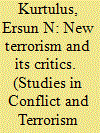|
|
|
Sort Order |
|
|
|
Items / Page
|
|
|
|
|
|
|
| Srl | Item |
| 1 |
ID:
116873


|
|
|
|
|
| Publication |
2012.
|
| Summary/Abstract |
Relative social and economic well-being in the aftermath of a state's collapse is usually explained on the basis of a single case, Somalia, and with reference to the impact of endogenous factors such as the repressive and predatory nature of the state which collapsed and the ability of civil society actors and institutions to fulfil those functions that are normally performed by a state. This article challenges this theoretical view. As can be seen from a study of Lebanon, relative well-being after state collapse is more common than it appears to be at first glance. Moreover, given the limited role that the Lebanese state played in the economic and political spheres before the breakdown of state authority in 1975, the repressive and predatory nature of the collapsed state cannot be the explanatory variable in this case. Exogenous factors, such as remittances from abroad, international loans bestowed upon residual state institutions and 'political money' from foreign powers, are the decisive factors generating such paradoxical developments. Study of Somalia and Lebanon also shows the limitations of the conceptualisations of state collapse prevalent in the literature.
|
|
|
|
|
|
|
|
|
|
|
|
|
|
|
|
| 2 |
ID:
110850


|
|
|
|
|
| Publication |
2012.
|
| Summary/Abstract |
In the first decade of the twenty-first century we are witnessing the emergence of a new form of counterterrorism in several democratic states. This new counterterrorism is ideological-religious in its rhetorical outlook, networked in its organizational structures, increasingly lethal in its operational tactics and more and more brutal in its methods. The shift to an ideological-religious discourse can be traced back to a conceptual transformation about the nature of terrorism, from the notion of terrorism as a "crime" to that as a "war". The latter, differently from the former, requires ideological justification, which in states with strong religious constituencies, such as the USA and Israel, can partially be sought and acquired on a religious basis. Second, the new counterterrorism is based on normalization of extra-judicial means in the fight against terrorism. This has happened at three levels: by creation of overt and covert extra-jurisdictional domains-or legal black holes-outside of the human rights regimes of democratic states, by legitimization of torture at political, intellectual and popular cultural levels and by increasingly widespread use of extra-judicial killings of terrorist suspects. Third, the tactics used by new counterterrorism agencies are increasingly lethal and lead to disproportionately high number of casualties among innocent civilians. This development is to a large extent due to hardening of traditional counterterrorism targets and use of imprecise technology and intelligence in operations. Finally, the new counterterrorism is networked and often beyond the control of the judicial sovereignty of courts. This is largely due to informal contacts developed within the framework of the post 9/11 extraordinary rendition program and outsourcing and privatization of counterterrorism related activities and the ensuing contractual arrangements between state institutions and private enterprises.
|
|
|
|
|
|
|
|
|
|
|
|
|
|
|
|
| 3 |
ID:
106575


|
|
|
|
|
| Publication |
2011.
|
| Summary/Abstract |
This article attempts to fulfill a lacuna in the literature on terrorism by providing a systematic response to the widespread criticism of the concept of "new terrorism." According to this conceptualization, the "new terrorism" is characterized by religious motivation, networked organizational structures, tendency to launch mass casualty attacks and possible use of weapons of mass destruction. This conceptualization is criticized by scholars who argue that religiously motivated terrorism has always existed; that increased frequency of mass casualty attacks is due to other factors; that traditional terrorists were also indiscriminate in their targeting; and that there is nothing new about terrorist attempts to use WMDs or horizontal terrorist networks. These critics are not convincing on three counts: they adopt a rudimentary notion of "new" which is hardly appropriate for detecting or understanding social change; they employ inappropriate categories and labels, which make it impossible to distinguish the characteristic features of new terrorism from those of the old; and several critics create a straw man version of the "new terrorism" argument by resorting to reductionist interpretations. The article points out that the contemporary terrorism is not only religious, but is also characterized by the absence of several ideological and political imperatives for centralized and hierarchical organizational structures and for using discriminate violence that characterized left wing and ethno-nationalist terrorism of the past. The critics also ignore the fact that there is a declared intention on the part of new terrorists to organize horizontally through networks and to kill indiscriminately among civilians.
|
|
|
|
|
|
|
|
|
|
|
|
|
|
|
|
|
|
|
|
|